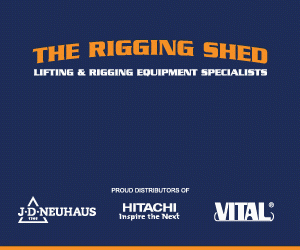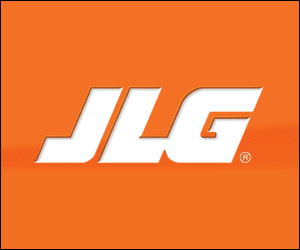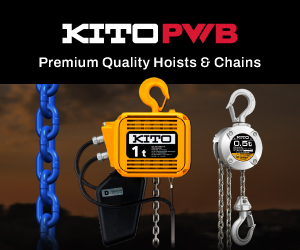)
Prioritise compliance
Think about what’s more important: where a product is from or its compliance with relevant standards.
Brace yourself: as good as Aussie-made product is, 90% of the lifting and rigging gear sold in Australia is imported from Europe, the States, Asia, or elsewhere. Much less product is manufactured here than people think. That’s why so many people scoff at ‘foreign’ product as though it’s in the extreme minority. It isn’t. Labour costs here are far too high compared to the rest of the world and, while the products are as good as anywhere, it’s bordering on impossible to sustain widespread manufacturing.
The good news is that trend means compliance is more important than origin, which is exactly how it should be.
Our shelves are stocked with products from all over the world. Where they come from doesn’t really matter to us, at least not in isolation. The slings might be from Australia and the harnesses from the UK. That box of shackles from Germany, and that batch of hooks from China. All have been sourced with the strictest selection criteria based on their intended use, and no equipment is disregarded based purely on its origin of manufacture. However, there are still people out there who are intent on questioning the safety of products made overseas.
What matters is the manufacturing process, the materials, testing, suitability, etc. Is every product from Asia as good as the products from Germany or Australia? Absolutely not. But we must look at each sling, shackle, hoist, crane, and spreader beam and judge it on its own merit. Focussing on where a product is from and not how it’s made means we overlook what’s important, such as what is being asked of that product and its compliance.
Global industry
Overseas manufacturing has improved a lot in recent years. We work with a number of foreign manufacturers that have become very proficient at what they do. I’ve personally visited many manufacturing sites, all over the world, and I’ve been impressed every time. The production, installation, quality assurance, warehousing and fulfilment departments were fitted out with state-of-the-art equipment and organised in accordance with the latest ergonomic sciences. You could forget you’re not in Australia. On the other hand, there are basic, dated manufacturing facilities in all regions where lead times are longer and the product not as fit for purpose.
In most industries, companies like to question the integrity of their competitors’ supply chains. The reality is that people don’t want to lose orders and many are tempted to question the integrity of the products that are chosen over theirs. It’s a foolish practice because, here in Australia, we operate to the strictest of standards. If products meet all the requirements, it doesn’t matter if they are made on our shores, in Europe, or China. Customers might be prepared to pay another 5% but not 20% just because an item is made in Australia.
Further, there is enough business out there for all of us and we don’t need to constantly find a point of difference. If we provide one product or solution and another supplier looks at it differently, we let the customer decide.
When you buy something that’s Aussie-made, it gives you a sense of pride and if you’ve purchased that product at a great price, even better. But the reality is that you are almost always looking for the cheapest product that meets the required standards and specifications. It’s just business. In an ideal world, we’d all have bottomless pits of money and would pay top dollar only for homegrown produce and Australian goods, but any good business, or even any well-run household, relies on decision makers getting value for money.
You’ve got to be careful who and what you judge on first impressions too. For example, where does a product actually originate from? Is it an item, such as a chain hoist, that has been entirely manufactured overseas? Or is it an item that contains a component that has been made abroad, like a crane installed by an Australian crane builder but with overseas components? Fact is that many products ‘made here’ contain imported components. Does that make them good or bad? Neither, based on geography alone.
Entry requirements
When we’re thinking of working with a new supplier, we don’t ask for a passport; we consider the longevity of a company’s presence in the marketplace. We also look at whether they have a history of service delivery and what support is available. We talk to them about their manufacturing processes and we consider their ability to manufacture to the highest standards. If they’re particularly cheap, we ask why. It might be that the cost of materials and labour are just comparatively low, not that corners are being cut.
We’ve been stakeholders in this marketplace for over 20 years and we study it daily; we travel the world (in normal times), from places where manufacturing used to have a bad name, to the most industrial corners of Germany where it is globally renowned. We’ve been using some overseas manufacturers for over a decade and many were recommended by UK-based contacts that had previously been using them for many years.
Actually, we even pay a little more to work with recommended companies that, based on the quality of product, might even have a longer lead time that we have to factor into our stock levels and supply chains. We don’t walk out on suppliers lightly, but nor would we remain loyal to anyone whose standards slipped. As a word of caution, manufacturers’ samples are nearly always top notch – it’s batch three or four you might have to look out for. Guess what: if an order doesn’t meet standards or compliance, we don’t accept it.
What experience tells us is that both domestic and imported product can be high quality, safe, reliable – and compliant. Equally, both can be substandard. Regardless, we’re big on service through knowledge so if you want to know where a particular product was made just ask our team. They would be more than happy to chat to you about where our products come from and, more importantly, whether they are the right choice for your application.
Don’t buy something just because of the flag on the box.









